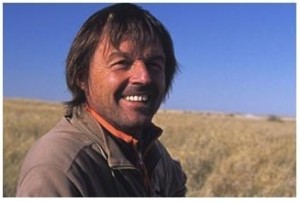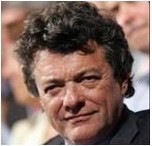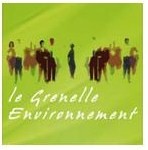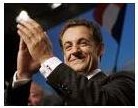Filed under: Sustainability in France, Sustainability News | Tags: Ecologist Party, French Presidential Elections, Nicolas Hulot, Pacte Ecologique, Verts
Photo credits : AFP (Le Figaro)
‘Nothing in my DNA would have forecasted the decision that I have made today’, says Nicolas Hulot.
The former television reporter, environmental activist and ‘free electron’ Nicolas Hulot has announced today to be candidate for the presidential elections in France in 2012 – leading the French Ecologist Party.
Nicolas Hulot is known in France as the creator of the Manifesto Pacte Ecologique in 2006, signed by 750 thousand French people, urging the French government to put Sustainability higher on the political agenda.
Even Nicolas Sarkozy signed the pact. After being elected in 2007, extensive consultation rounds and the development of the new sustainability laws ‘Grennelle de l’Environnement’. The Grenelle has been both widely admired as well as received much criticism because the laws were considered not sufficient enough.
What decided Hulot to become candidate for the presidental elections ? Hulot sees it as a ‘Personal Mission’. Having been active for 35 years wants to ‘change the current system that is not sustainable’ and ‘contribute to a new society that is more ecologically and socially viable’. Hulots feels strongly supported by its own party members and the younger generation.
Aware of his blind spots, Hulot has been consulting experts from various disciplines. Hulot will need to build a convincing Ecologist Party program that tackles not only environmental issues for which he is publicly known, but also bringing in solutions for the countries economical and social issues such as the large jobless population, the number of paperless people and the significant state deficit. In the coming months Hulot will provide information on his website www.2012hulot.fr.

As a consequence of his policital involvement, Hulot has stepped down as the president of the NGO that he founded 20 years ago. ‘Fondation The foundation will continue its activities to create liveable and sustainable societies by engaging with citizens, governmental bodies and enterprises – such as Bouygues Telecom. The Foundation will be renamed ‘Fondation pour La Nature et Des Hommes’.
Sources : http://www.fondation-nicolas-hulot.org/blog/declaration-de-cecile-ostria-directrice-de-la-fondation-suite-lannonce-de-nicolas-hulot / http://www.lemonde.fr/idees/article/2011/04/13/nicolas-hulot-j-ai-decide-d-etre-candidat-a-la-presidentielle_1506793_3232.html / http://www.lefigaro.fr/politique/2011/04/12/01002-20110412ARTFIG00697-2012le-jour-j-de-nicolas-hulot.php / http://www.electionspresidentielles.org/candidats/detail/nicolas-hulot.htm / http://www.2012hulot.fr/
Filed under: Sustainability in France | Tags: France, Grenelle d'Environnement, Jean-Francois Borloo, Nicolas Hulot, Nicolas Sarkozy, Pacte Ecologique, Sustainable Development
Nicolas Hulot launched the ‘Pacte Ecologique’ in 2006
Changing public opinion. Most French people seemed to be indifferent to environmental and social issues. Now the buzz is on. How did this happen ?
Nicolas Hulots ‘Pacte Ecologique’ . French Non-Governmental Organisations (NGOs) sat together end of 2005. They concluded that they should change strategy to get their environmental and social goals higher on the political agenda. Lobby-ing and media exposure were needed. French TV personality Nicolas Hulot was asked to lead the media offensive. The Web Manifesto ‘Pacte Ecologique’ was launched in November 2006. Among the propositions of Hulot and his team, was the installation of a new Minister ‘Number 2’ of Sustainable Development. The Pacte Ecologique was signed by 750 thousand people. Among them were CEO’s, celebreties and presidential candidates, including Nicolas Sarkozy(1).
Jean-Francois Borloo, Minister of Sustainable Development and Energy, Transport and Town Planning ; le Grenelle d’Environnement, Nicolas Sarkozy, President of France
Sustainable Development in Sarkozy Government. Elected in 2007, President Nicolas Sarkozy had no choice but to take action . First, he appointed the seasoned Jean-Louis Borloo at his new Mega Ministry of ‘Energy, Transport, Town Planning and Sustainable Development’. Second, he organised extensive public debates to define new state directions. The discussions that followed were without precedent. Over 30.000 individuals and representatives participated . Never before representatives of government, industry, trade unions and NGO’s actually sat together and discussed about environmental and social challenges. The results called ”le Grenelle d’Environment‘ were presented by Minister Borloo in July 2007. The Grenelle contains France’s key environment and social guidelines for the coming 5 years. Since 2007, new laws and public investment plans are under construction and will soon be implemented.
Sources : 1. http://www.pacte-ecologique.org ; 2. www.legrenelle-environment.fr





